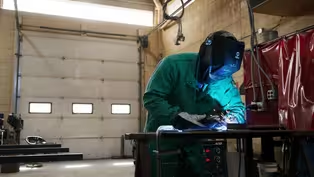
North Carolina is Betting Big on the Oyster
Clip: 3/7/2025 | 6m 32sVideo has Closed Captions
North Carolina's oyster industry is booming again, but can farmers avoid the mistakes of the past?
North Carolina's once-booming oyster industry collapsed a century ago, leaving many coastal communities struggling. Today, a new generation of farmers leads a remarkable comeback through sustainable aquaculture. With oyster farming experiencing 500% growth in the past decade, can these modern pioneers avoid the mistakes that sank the industry before?
Problems playing video? | Closed Captioning Feedback
Problems playing video? | Closed Captioning Feedback
ncIMPACT is a local public television program presented by PBS NC

North Carolina is Betting Big on the Oyster
Clip: 3/7/2025 | 6m 32sVideo has Closed Captions
North Carolina's once-booming oyster industry collapsed a century ago, leaving many coastal communities struggling. Today, a new generation of farmers leads a remarkable comeback through sustainable aquaculture. With oyster farming experiencing 500% growth in the past decade, can these modern pioneers avoid the mistakes that sank the industry before?
Problems playing video? | Closed Captioning Feedback
How to Watch ncIMPACT
ncIMPACT is available to stream on pbs.org and the free PBS App, available on iPhone, Apple TV, Android TV, Android smartphones, Amazon Fire TV, Amazon Fire Tablet, Roku, Samsung Smart TV, and Vizio.
Providing Support for PBS.org
Learn Moreabout PBS online sponsorship- 120 years ago, the oyster industry was booming here in North Carolina, so much so that the state passed laws so that fishermen from outside the state couldn't come here to fish in our coastal waters.
However, overfishing, disease, and pollution devastated the oyster industry, and for the past hundred years, the industry has all but clammed up, but over the past decade, North Carolina's oyster aquaculture has experienced a staggering 500% growth.
So, what's behind this historic comeback and can they avoid making the same mistakes that caused the industry to bust?
And will it be enough to turn this small little oyster into North Carolina's next cash crop?
Let's find out.
[poised music] [inquisitive music] North Carolina's coastline was once dominated by vast oyster reefs, underwater cities that filtered water and protected our shores.
The 1880s saw these oysters shipped by boxcar across America from San Francisco to New York.
By 1902, harvest peaked at 800,000 bushels.
That's 5.6 million pounds of oyster meat.
- Our shellfish industry, it's a community asset.
It's a part of the inheritance for North Carolina.
- [David] But the boom wouldn't last.
Overharvesting, habitat loss, and disease devastated these natural reefs.
As oyster populations vanished, coastal towns that were relied on canneries and processing facilities saw their economic lifeline disappear.
While wild oyster harvests have slowly recovered through restoration efforts, they're nowhere near their historic peaks.
Instead, it's farmed oysters that are writing the next chapter.
In 2019, farm-raised oysters surpassed wild harvests for the very first time.
Today, most oysters on your plate, whether raw, grilled, or fried, come from farms.
In 2022, North Carolina's shellfish industry contributed $31.7 million to the economy.
Even more impressive, nearly half of that, $14.6 million, came from farmed oysters alone.
And some want that $14 million to grow to $100 million.
Meet the Mera brothers: Eduardo, Roberto, and Fernando.
They're the faces behind one of over 300 oyster and clam farms along the North Carolina coast.
- So, right here in the front is typically where we get our market-ready oysters.
- [David] Their story starts in Ecuador where they watched their grandfather farm shrimp.
When their parents brought them to America, they carried that connection to the sea with them.
Today, they work in the waters of Oyster Creek in Davis, North Carolina, - Every single body of water is gonna be different saltiness, so you know, vegetal flavors, metallic, kind of just its own distinct flavor.
- [David] The water here hits a perfect sweet spot, 28 parts per thousand salinity.
Mm.
- Yeah.
That's where it's at.
- That's good.
Their oyster farm started with two small leases in Oyster Creek.
Now, they're sending 4,000 to 5,000 oysters each week to restaurants across the Southeast and Mid-Atlantic.
- Yeah, so typically what we like to see is an oyster that has, like, a nice cup, but my favorite, you know, out of these, I'd probably go for something, like, a little bit smaller, nice two and a half inches.
That's what a lot of restaurants like to see nowadays.
Nice and cold, just ready to go.
- [David] But while the oyster industry is booming, it's not without its challenges.
In Eastern North Carolina, breaking into the oyster industry means overcoming significant hurdles.
- That's really one of the biggest barriers is finding a new lease.
Like, yeah, 'cause you have to have a public hearing for it.
The community has to agree, they have to not mind seeing it, and it's kind of a process.
We got lucky with this one.
- [David] Even if you have a lease, starting an oyster farm requires significant upfront investment in equipment and inventory.
- A lot of times, people just need an opportunity, they can sell themselves, they can provide the service, but in a rural area, sometimes it's just, it's hard to get that opportunity.
- [David] Recognizing these challenges, the Array Community Development Corporation created a solution: the Shellfish Growers Loan Fund.
It provides low-interest loans to small businesses for startup and expansion.
- I mean, we have this beautiful ocean coastline and people can actually make a living here with aquaculture and shellfish farming.
- [David] And Array goes beyond just providing capital.
They offer crucial support in marketing, sales, and distribution.
But despite this support, small growers face significant logistical challenges that Array is not designed to address.
You see, federal law requires all oysters to be refrigerated within five hours of harvest.
For small-scale farmers without onsite refrigeration, this regulation can limit their ability to grow, so North Carolina is investing in infrastructure.
Construction will soon begin on a shellfish aquaculture hub in Carteret County.
It's a place where growers can collaborate, store gear, and refrigerate their products right on the waterfront.
- If we all grow together, the whole industry's gonna grow together.
There's gonna be more demand for us.
There's gonna be, you know, just a nice camaraderie between, you know, what, instead of having competition, it's just, there's like, I always say, there's enough slice of pizza in the pizza pie.
That's it.
- [David] But could this boom go bust like before?
North Carolina's oyster populations are just 15 to 20% of their historic levels, decimated by overfishing and pollution.
Today's threats are even more complex: rising sea temperatures, ocean acidification, and extreme weather.
But there's a crucial difference this time: modern oyster farming actually benefits the environment.
Each farm creates its own ecosystem, filtering water and building marine habitats, and the state is betting big on this sustainable approach.
With $16 million in federal grants and state funding, North Carolina is building new oyster habitats.
They're even expanding oyster shell recycling programs to ensure these waters stay productive for generations to come.
For the Mera brothers, this state investment and community support is already paying off.
- [Fernando] We got top meat.
- Yeah.
- Oh yeah.
[laughs] - Mm.
- 10 outta 10?
- Oh yeah.
Oh yeah.
- 10 outta 10.
[David laughs] - [David] While the oyster industry hasn't always gotten a perfect score, today's approach shows promise.
The mistakes of the past have become lessons for a new generation of farmers.
For "ncIMPACT," I'm David Hurst.
How A Dying Downtown Sparked a Small Business Revival
Video has Closed Captions
Clip: 3/7/2025 | 7m 43s | When Marion, NC's downtown was dying, leaders tried something unexpected—and it worked. (7m 43s)
Preview | Economic Development
Video has Closed Captions
Preview: 3/7/2025 | 20s | As some cities boom in a growing state, small towns craft homegrown solutions for their future. (20s)
This Community College is Betting Big on Adult Learners
Video has Closed Captions
Clip: 3/7/2025 | 6m 49s | An innovative program at Wilkes Community College is helping adult learners complete their degrees. (6m 49s)
Providing Support for PBS.org
Learn Moreabout PBS online sponsorship
- News and Public Affairs

Top journalists deliver compelling original analysis of the hour's headlines.

- News and Public Affairs

FRONTLINE is investigative journalism that questions, explains and changes our world.












Support for PBS provided by:
ncIMPACT is a local public television program presented by PBS NC


